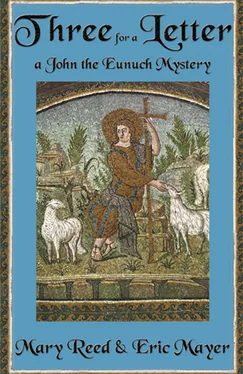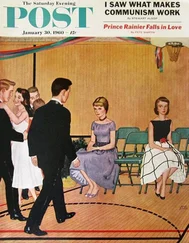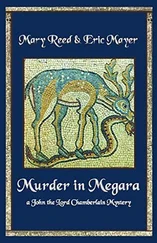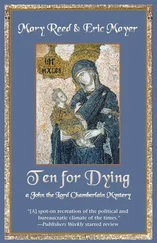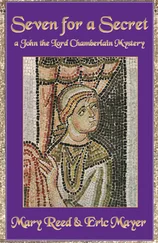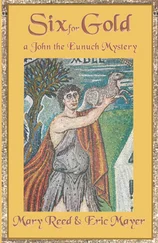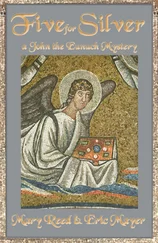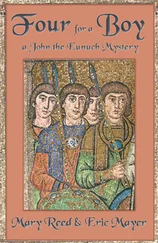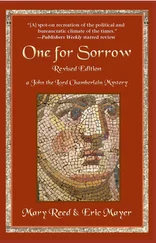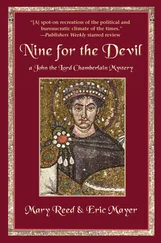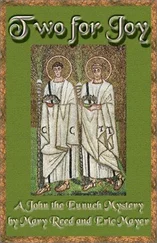Mary Reed - Three for a Letter
Здесь есть возможность читать онлайн «Mary Reed - Three for a Letter» весь текст электронной книги совершенно бесплатно (целиком полную версию без сокращений). В некоторых случаях можно слушать аудио, скачать через торрент в формате fb2 и присутствует краткое содержание. Год выпуска: 2011, ISBN: 2011, Издательство: Poisoned Pen Press, Жанр: Исторический детектив, на английском языке. Описание произведения, (предисловие) а так же отзывы посетителей доступны на портале библиотеки ЛибКат.
- Название:Three for a Letter
- Автор:
- Издательство:Poisoned Pen Press
- Жанр:
- Год:2011
- ISBN:9781615951758
- Рейтинг книги:5 / 5. Голосов: 1
-
Избранное:Добавить в избранное
- Отзывы:
-
Ваша оценка:
- 100
- 1
- 2
- 3
- 4
- 5
Three for a Letter: краткое содержание, описание и аннотация
Предлагаем к чтению аннотацию, описание, краткое содержание или предисловие (зависит от того, что написал сам автор книги «Three for a Letter»). Если вы не нашли необходимую информацию о книге — напишите в комментариях, мы постараемся отыскать её.
Three for a Letter — читать онлайн бесплатно полную книгу (весь текст) целиком
Ниже представлен текст книги, разбитый по страницам. Система сохранения места последней прочитанной страницы, позволяет с удобством читать онлайн бесплатно книгу «Three for a Letter», без необходимости каждый раз заново искать на чём Вы остановились. Поставьте закладку, и сможете в любой момент перейти на страницу, на которой закончили чтение.
Интервал:
Закладка:
John remarked that it seemed a lively enough presentation even without the presence of the famous mime.
Brontes’ expression brightened. “Are you from the palace, by any chance, sir? You might mention A Stepmother and Three Donkeys around the court if you are. I can assure you that it’s highly entertaining. The plot involves a young noblewoman who has taken a romantic fancy to her husband’s slave because of his beautiful poetry, but as it turns out, the slave is only pretending to be a eunuch.”
John changed the subject. “Do you have many visitors inquiring for Barnabas?”
“Why do you ask?”
“You seem unconcerned by my visit.”
One of the listening donkeys called out, “There’s always high-born folks coming around looking for Barnabas’ services. Mostly young ladies. They just can’t get enough of Barnabas.” Both actors sniggered loudly.
Brontes’ fists clenched and he directed a thunderous look over his shoulder, silencing the pair. “The fool exaggerates, but he’s right, Barnabas is much sought after-for his talents as a mime, I mean. He has so many private engagements that he can barely honor his contract with the theater although he’s managed to do so, despite his popularity. Or at least until now.”
“And you say he hasn’t returned?”
“No.” Brontes looked thoughtful and then grinned. He let out a bellowing laugh. “Perhaps he’s found a high-born lady who wants to be more than just a patron! Ha! Well, I’ve always liked his lodging. Perhaps he won’t be needing it any more and I can get the lease!”
John asked where the mime lived.
“Just across the square. That’s why I’ve always liked it.”
The donkeys began quarreling again. One of them removed a long ear and flung it at the other, narrowly missing his target. John stepped nimbly aside as the flapping appendage flew past him. He asked Brontes to point out where Barnabas resided.
“Certainly, if it will help you to find him.” Brontes jumped down from the stage. “And if you do find him,” he rumbled loudly enough to be heard all over the theater, “tell him that Brontes needs his help in thrashing a pair of fools into shape! For even though he’s small, he’s stronger than a blacksmith. That’s very useful in our profession, as you can imagine.”
***
Barnabas’ lodging was a modest second floor room in a solid brick building on the opposite side of the square dominated by the theater. Brontes produced a key, explaining that Barnabas allowed him to use the room when he was absent.
“It’s closer than my place and boys can be so timid once they’re offstage. They often need instructing in the profession, you understand. No more than that,” he added quickly. “We’re all aware of the emperor’s exhortations against unnatural lust. I hear he says it’s the sort of thing that causes earthquakes and pestilence. We certainly don’t want any of those, and in any event none of us would even think of flouting his laws to begin with.”
“No, none of us would.” John stooped slightly to enter the room. City apartments were not built on the grand scale of the palace.
The apartment had the appearance of the home of a person who was rarely at home. There were no coals in the brazier sitting in an alcove nor did any pots hang from the hooks on the wall behind it. The walls were whitewashed and plain. The theatre’s colonnaded front could be seen from the room’s small window.
“You would be able to hear the audience if you opened the window,” Brontes remarked. “Especially when it’s a particularly good performance. Or even sometimes when it isn’t and our patrons are making their displeasure known.”
The room was sparsely furnished with a chest, a table with a pair of stools, and a bed with a bright red coverlet. A tall cupboard stood against one wall. Evidently Barnabas did not feel the necessity of gathering together a large number of the world’s riches, although he was certainly paid extremely well for his frequent work at the palace and elsewhere. John said as much to Brontes.
“I believe he’s a frugal man, and he’s putting as much as possible aside towards his retirement. He’s a wonderful acrobat but we all get older. There’ll come a day, not too long from now perhaps, when his body just won’t do his bidding any longer.”
It was true, John thought. He wondered if Brontes was also referring to himself for though he was not yet old, he was not a young man either.
John looked around again. One corner of the room was stacked with theatrical props, among them ecclesiastical garments and several large, obscenely stuffed phalluses.
“Barnabas uses those for one of his acts,” Brontes confirmed John’s surmise nervously. “It’s very popular at the palace.”
Suppressing a smile, John remarked that Barnabas was a particular favorite of Theodora’s.
“Very true. What a wonderful jest! The little actress being entertained herself, rather than entertaining others. I would never have prophesied such a future for her.”
“You have met Theodora?” John concealed his surprise.
“I knew her in the days when she was working in the theater, and behind the theater as well if I dare say it,” Brontes replied boldly.
“Everyone dares say so but not within her hearing, Brontes.” John was examining the line of erotic amulets hung along the window frame.
“Oh, I could tell you some tales about Theodora,” Brontes went on confidentially. “I worked with her on more than one occasion. Yes, the empress herself and Brontes are old friends. But now she’s a very great lady, all turned out in silks, gold, and jewels. Her ladies-in-waiting put more clothes on her every morning than she wore in all her years in the theatre put together! Not that I knew her except as a colleague, you understand. Of course, if you’re from the palace, you’ll have caught a glimpse of her.”
“From time to time,” John agreed. He hoped Brontes was not about to relate how he had personally witnessed Theodora remove her clothing and lie on the floor while geese pecked grain from her naked body. It sometimes seemed there was not a single person in all Constantinople who had not been present at that alleged performance, including many at the time unborn. “Did Barnabas also know her during her theatrical days?”
“I shouldn’t think so, since he’s somewhat younger than I am.”
John opened the chest, revealing nothing more than several neatly folded tunics and other garments.
“Everything here’s in its usual place as far as I can tell,” Brontes volunteered.
“Have you used this room in the past week?” John dropped the lid on the chest.
Barnabas said that unfortunately he had not been so fortunate.
If Barnabas had returned here in his flight from Zeno’s estate, John concluded, there was no evidence of it. The room was clean and neatly arranged, just as a meticulous person would leave it before departing for a few days.
There remained only the contents of the tall cupboard to be examined.
Expecting it to contain clothing or more theatrical props, John found instead at least part of the answer concerning what Barnabas did with the money he obviously did not spend on material comforts.
The cupboard was filled with dozens of codices and scrolls, neatly arranged in specially made racks.
John pulled out a scroll, which turned out to be Vitruvius’ work on architecture. There was a codex of Plotinus’ Enneads and much more besides. Any one of them would have cost more than a laborer’s annual wages.
“Barnabas was always quite the reader,” remarked Brontes, somewhat superfluously.
John produced a coin, twin to the one he had given the Egyptian at the docks, and handed it to Brontes with the same instructions concerning his interest in acquiring information about Barnabas’ whereabouts.
Читать дальшеИнтервал:
Закладка:
Похожие книги на «Three for a Letter»
Представляем Вашему вниманию похожие книги на «Three for a Letter» списком для выбора. Мы отобрали схожую по названию и смыслу литературу в надежде предоставить читателям больше вариантов отыскать новые, интересные, ещё непрочитанные произведения.
Обсуждение, отзывы о книге «Three for a Letter» и просто собственные мнения читателей. Оставьте ваши комментарии, напишите, что Вы думаете о произведении, его смысле или главных героях. Укажите что конкретно понравилось, а что нет, и почему Вы так считаете.
